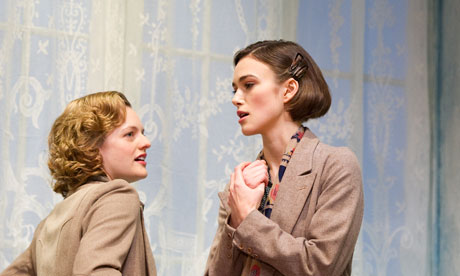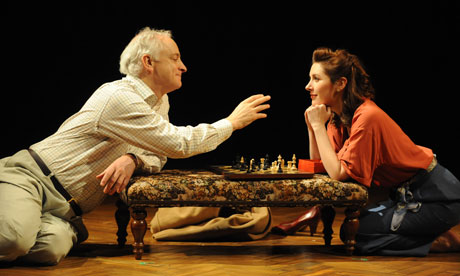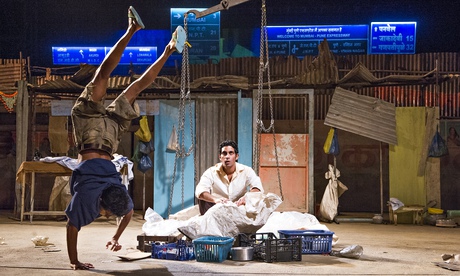There have been reports of one ticket changing hands for £900. Ian (Jerusalem) Rickson's production of The Children's Hour will be worth that for fans of Keira Knightley and Mad Men's Elisabeth Moss: they'll be in the same arena as two stars who prove they can act off-screen. It isn't worth that as a theatrical experience: neither actor is transcendent; the production – startlingly, as Rickson is habitually both delicate and acute – is listless.
Knightley, last seen on the West End stage playing a Hollywood actress in The Misanthrope, delivers her part – of a bobbed and tweeded 1930s schoolmistress falsely accused of having a lesbian affair – with a fine-boned bleakness. She is restrained and contained, at times to the point of vacancy, making some of her effects by tilting herself in the direction of the audience as if they were her camera. Elisabeth Moss, gleamingly voracious in Speed-the-Plow a couple of years ago on Broadway, plays the other accused with more decision. There is vinegar in her voice; her gestures (apart from a wearingly repetitive flinging apart of her arms) are pinched.
Still, the real acting story is elsewhere. Both women look one-dimensional beside the tumbling energy of Bryony Hannah as the schoolgirl who accuses her teachers and causes their ruin. This is a child with a dybbuk inside her, who doesn't so much flop on to a sofa as somersault into it. She often looks as if she's head-butting an invisible antagonist. She is almost entirely unlovable. It is as if she has punched her way into the play from an entirely different school of acting.
Her very energy makes a fissure in the play. Or perhaps exposes a faultline. The Children's Hour isn't much good. Rickson does his best to import some inflections. Mark Thompson's pale wood design, with elongated doors, and bookshelves too high for any teacher to reach, makes the schoolmistresses into children in their own house. Still, as the plot rasps (who would believe this nasty kid?), the interest of the play now looks adventitious. It has a political dimension. First staged in 1934, the play was revived in 1952, when it rivalled Miller's The Crucible as a dramatic metaphor for the hounding of Communist sympathisers. It also has a biographical allure. Lillian Hellman, who wrote a play that hinged on a lie, would herself be loudly accused of lying. She had two McCarthys in her life: Senator Joe, at whose anti-Communist hearings she refused to name names, and author Mary, who was to declare that every word Hellman wrote was an untruth, "including 'and' and 'the'".
This background has lent The Children's Hour a thrill. But it hasn't supplied it with a rich vocabulary. Hellman would have done better to use more of the 19th-century Scottish case on which she based her play. According to court documents, the tattling child talked of the noises she heard at night with an immediacy absent from The Children's Hour: they were, she said, like the sounds made by "putting a finger into the neck of a wet bottle" or by a "dairy maid patting butter".
A year after he took over as artistic director, Daniel Evans is impressing himself further on Sheffield Theatres with a season of David Hare plays. Evans will direct Racing Demon, and Peter Gill The Breath of Life; there are to be readings and discussions; Hare will perform his Middle East monologue Via Dolorosa. They could have called it Hare!
The season opens with Plenty, which moves from 1943 to 1962, charting the waning of social-democratic hope in postwar Britain through the disintegrating life of a diplomat's wife. The "plenty" of the title comes to look by the end of the evening more than ironic: it's as if Hare were actually saying enough, already. The play's targets – establishment fustiness, snobbery, racism and duplicity – aren't surprising, but the serpentine subtlety of the plotting is. It unwinds by looking at different kinds of lies: the principled subterfuge of wartime resistance, the truth-fudging of diplomacy, the tawdry disguises of advertising. Its attitudes are a Hare-brained mixture: both principled and progressive – not many dramatists make a woman representative of an era – and sentimentally flawed, since that woman, sensitive, volatile, beguiling, is aflutter with traditional femininity.
Thea Sharrock who, surprisingly for someone who ran the small Gate with radical zeal, is turning herself into the queen of revivals, renders the play meticulously, with a distilled sense of loss: the shadows are long; the bursts of string music are low; rain falls. Plenty may have had the force of anger when first produced in 1978; now, it has an autumnal air of inevitability. There is prescience in this: when a character inveighs against the Suez invasion, both Iraq and Mubarak leer from the wings. It is enhanced by Sharrock's direction: between scenes, Hattie Morahan is slipped into a series of costumes onstage – including a magnificent New Look frock in twilight shades with a shawl collar that, with Morahan in high heels and blond chignon, emphasises her misleading Grace Kelly cool. It's a wonderful device, making Morahan's character seem constantly exposed and always the toy of events. Morahan herself – from the beginning wide-eyed as if she is seeing too much – steers an exemplary fine line between fragile and brittle. Edward Bennett's crumpled and crusty husband meets her, suggesting a wistful glimmer underneath his waistcoat.
Richard Bean's new play is – hurrah! – the opposite of what we've come to expect from the climate-change dramas washing over the stage: the opposite of what we had last week from Greenland and, earlier, from Earthquakes in London. It's a tsunami of jokes, a meltdown of piety and po-facedness; it has at its centre an unexpected heroine: a concerned scientist who is seen by her fellow academics as a climate-change sceptic.
It's not simply the foregrounding of this view that's unusual, but the fact that it's held by a woman, emphatically not a David Hare woman. She is played with a beautifully calibrated, level conviction by Juliet Stevenson: you believe each of her rational taps on the laptop.
Jeremy Herrin's trim production doesn't attempt to visualise climate change: this is a play about the debate rather than the events that inspired argument. Greenland gave us a full-size elegantly ambling polar bear; The Heretic gives us a stuffed toy called Maureen. The emphasis is on the rapid-shooting of the dialogue. There's a good joke about The Archers and an admirable crack at the Almighty, who is, it is pointed out, not actually an atheist. At the same time, there is a disconcerting shift at the vivid personal centre of the play from scepticism to awe. James Fleet and Johnny Flynn are particularly strong; what's especially pleasing is the combination of unremitting intelligence with unremitting laughs. The Heretic makes most plays look underwritten.










